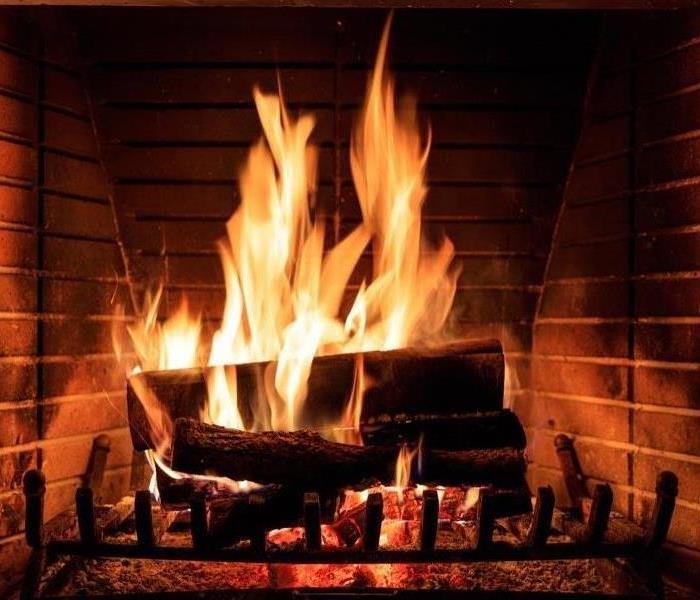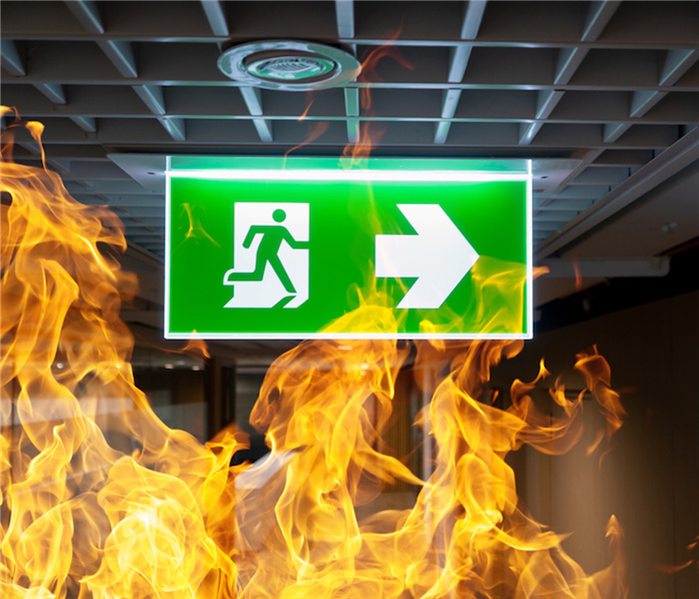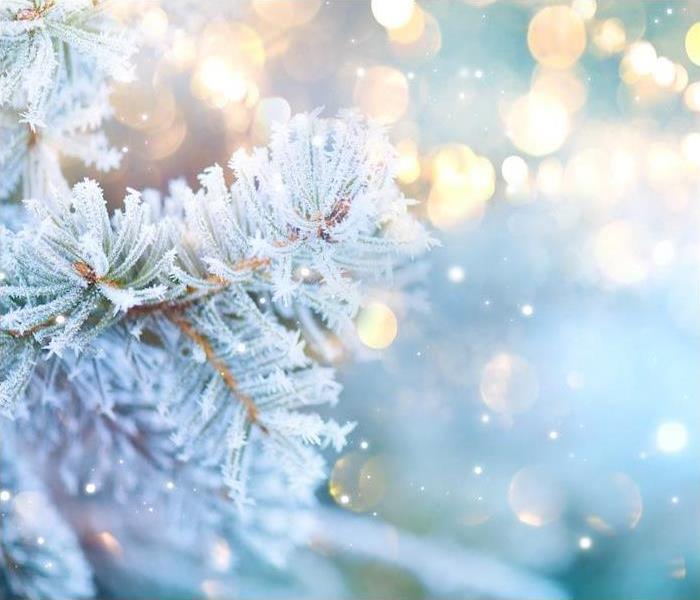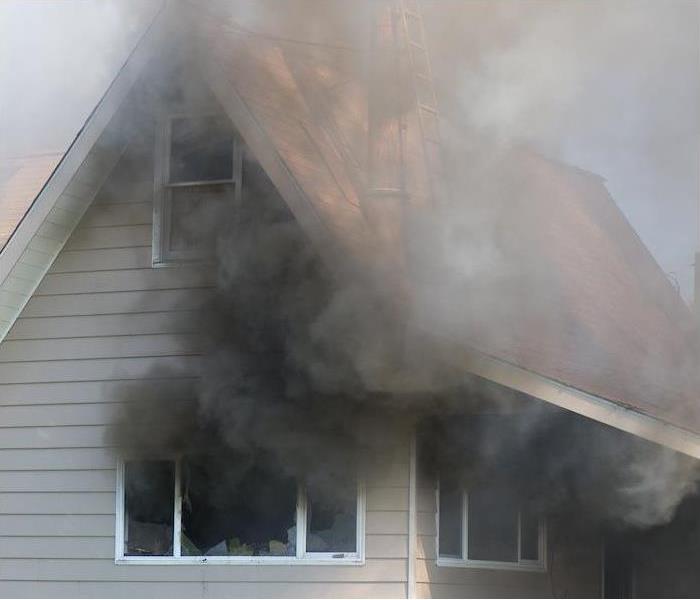Recent Fire Damage Posts
Chimney Safety
1/15/2021 (Permalink)
 Always educate yourself on fire safety!
Always educate yourself on fire safety!
Chimney fires happen every year and more often than you'd probably suspect. It's incredibly important that you're chimney is prepped and ready for a fire and that you are safely and properly maintaining the fire once lit.
Prior to using your chimney you should get it professionally inspected.. This will ensure that your flute is working properly and everything is safe and ready to go!
Once you have the OK, here are a few tips to safely enjoy fires all winter long!
- Burn fires that are proportionality sized for YOUR fire place. This makes it much easy to have the fire under control!
- ONLY burn proper wood and materials. Plastic and styrofoam should never be burned within a fire- especially indoors.
- Make sure there is a significant draft when burning a fire. However, be weary when choosing to light a fire on especially windy days. The draft may cause smoke to linger within your house rather than up and out of the chimney.
If you suspect your fireplace is a hazard or you've lit a fire that has become to large to handle, you should call 911 to properly handle the situation.
If you or someone you know has suffered the unfortunate instance of fire damage, allow us to take care of the damage and work to make it "Like it never even happened."
How You Can Reduce the Fire Risks That Could Affect Your Business | SERVPRO® of Queen Anne’s, Kent and Caroline Counties
2/25/2020 (Permalink)
 If your business has experienced a fire, we’re here 24/7 to respond and begin restoration. Call us today to learn how we can help you.
If your business has experienced a fire, we’re here 24/7 to respond and begin restoration. Call us today to learn how we can help you.
Being aware of any potential threats to your business is a smart move as a business owner, and it is important that you consider emergencies in that category as well. Commercial fires can be extremely harmful for businesses, leading to permanent closures in the most severe of scenarios. However, by doing what you can in advance to reduce your risks and make sure you are prepared, you can reduce the likelihood of a fire occurring at all.
In order to provide a helpful reference guide, we have assembled the top fire safety tips that business owners should know. By understanding your codes, specific risks and how to prepare your staff, you can make big strides toward your fire safety goal.
Fire Safety Tips for Every Business Owner to Follow
Follow code guidelines and inspection schedules. The first step is to understand fire safety codes that the National Fire Protection Association has published for commercial properties to adhere to. These will cover the equipment you need, how often to inspect it and any other standards that should be followed for your business.
Identify your specific risks. Every commercial risk profile will look a bit different depending on the business, which is why determining your own specific business risks is so vital. Being aware of any equipment, chemicals or other things that are present that could increase your fire risk will help you make sure you are taking the proper precautions.
Create (and practice) a fire evacuation plan. Preventing panic when a fire alarm sounds is essential to getting everyone in the building safely evacuated. One of the best ways to do this is by making sure everyone is prepared by hosting regular fire safety drills with your staff. This way, when the alarm sounds for real, they will know exactly what to do and can remain calm.
Have regular fire safety seminars with staff. Helping your staff review the general fire safety guidelines of your building is a great supplement to regular fire drills. The location of fire alarms and extinguishers, as well as any special protocols, is useful knowledge that can help everyone who works in the building feel more prepared.
Fire Prevention Tips for Winter
12/20/2019 (Permalink)
 If your home has been impacted by a fire, call us right away. We are leaders in restoration and can help you recover quickly after a fire occurs.
If your home has been impacted by a fire, call us right away. We are leaders in restoration and can help you recover quickly after a fire occurs.
Preparing for winter weather involves a lot of things, and it is important to add fire safety to that list as well.
Winter is the top time for fires to occur in homes, due to a variety of factors that contribute to making them more likely. By understanding common fire causes and prevention tips, individuals can have a safe season.
Why There Is an Uptick in House Fires
An Increase in Cooking
The NFPA findings repeatedly point to cooking as the leading reason house fires begin during all times of the year, with a sharp increase during the winter months. Being safe during cooking is an important thing to consider at any time of year, but especially during the winter.
The Risk of Heaters
Utilizing heating methods such as space heaters and wood stoves is common in the winter, but safety issues with these methods make them the second-most common fire starter as well. Making use of safety features, never leaving flames unattended and ensuring all heaters are equipped with emergency shut-offs will have a big impact in fire safety.
Candles and Decorations
Holiday decorations featuring candles and electronics are great for festive events, but it is important that they are used with caution. Never leave lit candles unattended to avoid the flame spreading to other objects. For decorations with electrical features, be sure to inspect the elements for wear and tear before use to prevent the risk of fire.
Preventing Winter Fires
Keeping winter fire safety tips in mind is an important part of having a fire-free season. Be sure to understand what events are likely to cause a fire in order to utilize extra caution, and keep these prevention tips in mind as well:
- Check smoke alarms once every 30 days and replace every 10 years.
- Always monitor open flames.
- Select space heaters with automatic shut-offs in case they tip over.
- Utilize a screen every time you use a fireplace.
- Draft and practice an emergency escape plan with your household.
Choosing Home Restoration Services in Advance | SERVPRO® of Queen Anne’s, Kent and Caroline Counties
12/6/2019 (Permalink)
 If you’ve been affected by a fire, reach out to us right away! We are here 24/7 to help you recover.
If you’ve been affected by a fire, reach out to us right away! We are here 24/7 to help you recover.
Fires can happen regardless of the weather, which is why fire preparedness is so important throughout the year. However, experts like the Red Cross recommend being extra prepared in winter months as that is when the rate of home fires peaks throughout the United States.
Planning for both during and after a fire is extremely important. Create an emergency escape plan so your entire family knows what to do the moment a fire breaks out. For afterward, knowing what restoration company to call can help things move along quickly so you can reclaim your home.
Choosing Us for Fire Restoration
It goes without saying that you want the company you choose for fire restoration to do a good job, but it is important to know what that means. Working with a company that will compromise on quality or service offerings can create further headache down the road—that is why we offer a three-step fire cleanup process to take care of everything for you:
Structural Cleaning
The structure of a home is made up of many important elements, all of which can be damaged in a fire. Beginning with establishing the extent of the damage with pretesting, we will then bring in the tools we need for restoration. We will clean and repair the area, and can even prepare soot-covered walls for paint application.
Content Cleaning
Replacing your items after a fire is often costlier than having them restored, which is why we make sure to have the tools on hand to clean a variety of belongings. Utilizing both wet and dry cleaning equipment, we can handle a variety of items from wood furniture to area rugs to electronics. This allows you to keep the items you love while ensuring they are cleaned, deodorized and safe to use.
Deodorization Services
Fires can leave behind smoke and soot odors that linger unpleasantly, but that is not the worst of it—they can cause negative health effects, too. That is why we have air scrubbing equipment to ensure these hazardous particles are removed instead of simply covering up odors with fragrances.





 24/7 Emergency Service
24/7 Emergency Service



